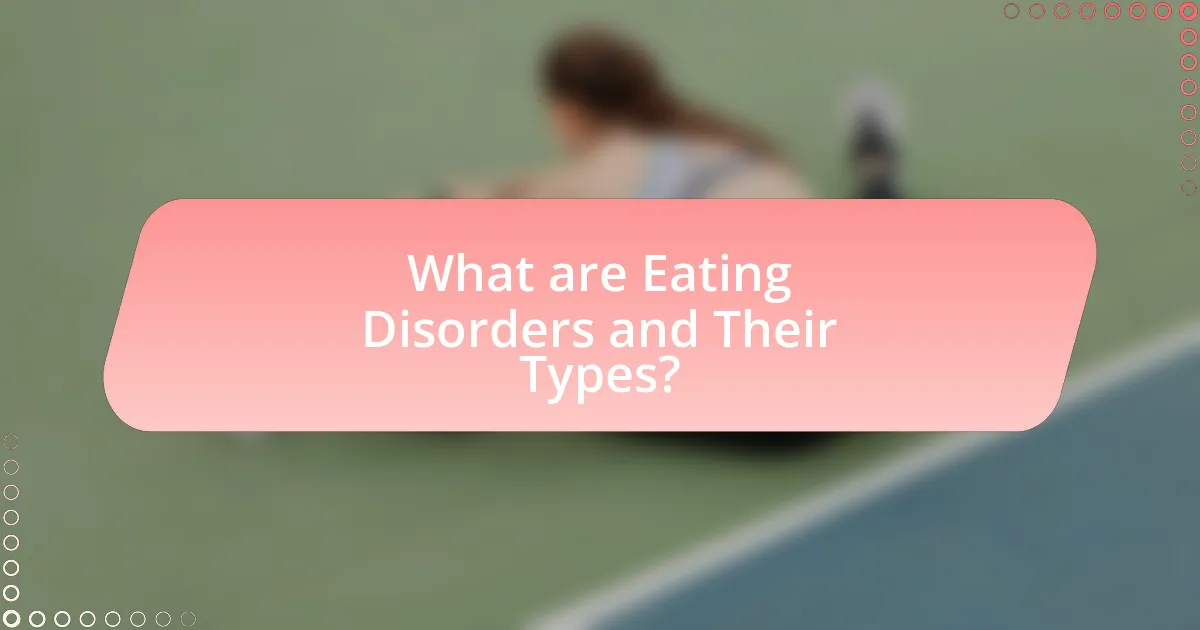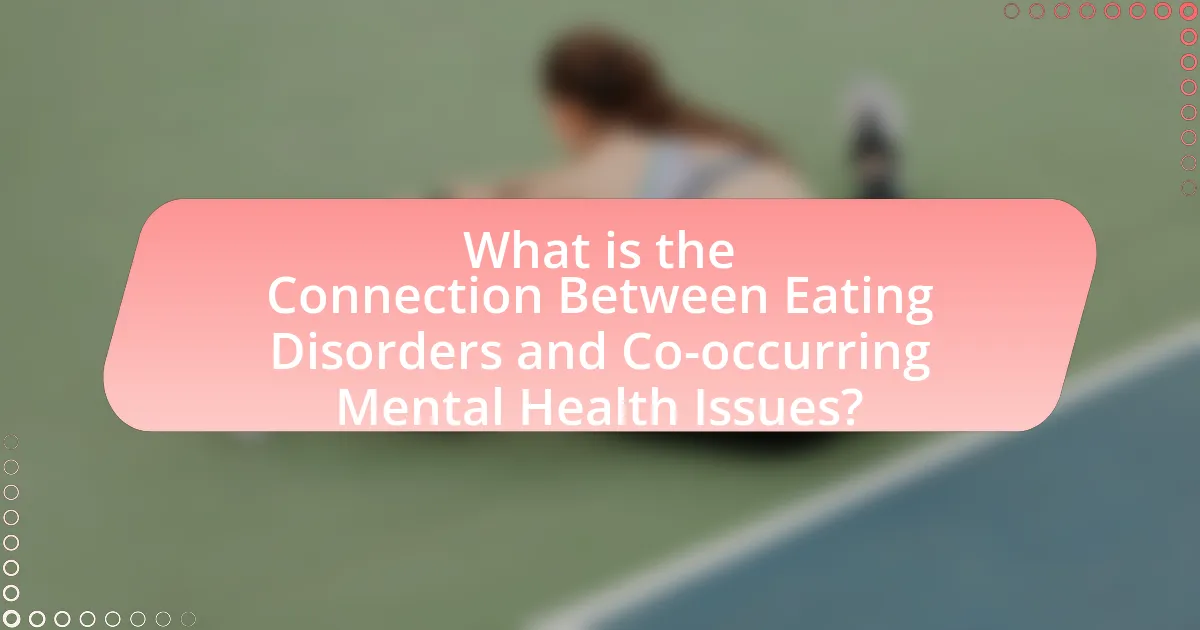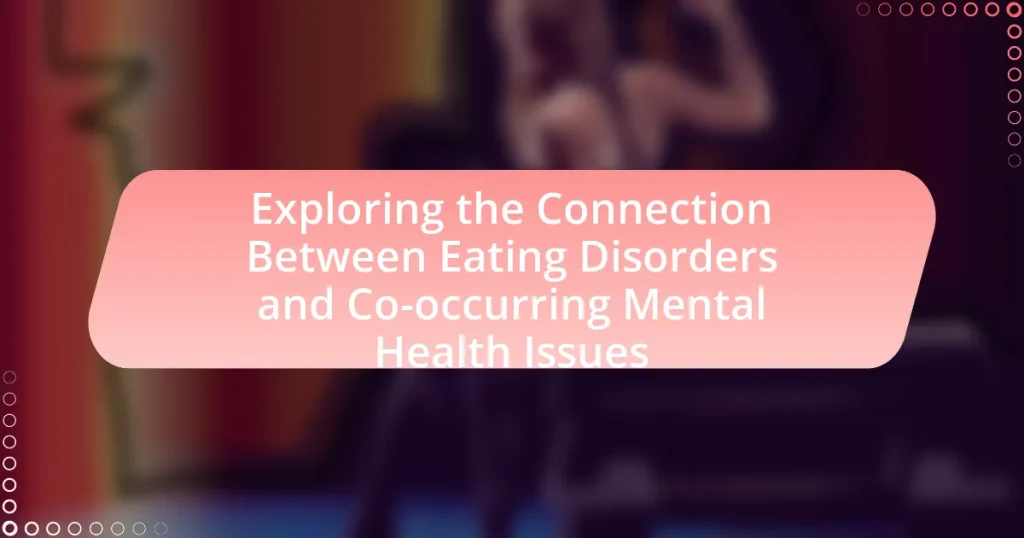Eating disorders are serious mental health conditions characterized by abnormal eating habits that adversely affect physical and emotional well-being. This article explores the various types of eating disorders, including anorexia nervosa, bulimia nervosa, and binge eating disorder, and examines how these disorders manifest in individuals through behavioral, emotional, and physical symptoms. It highlights the significant prevalence of co-occurring mental health issues, such as anxiety and depression, that often accompany eating disorders, complicating treatment and recovery. Additionally, the article discusses the genetic, psychological, and environmental factors contributing to the development of eating disorders, as well as the importance of integrated treatment approaches that address both eating disorders and associated mental health conditions for improved recovery outcomes.

What are Eating Disorders and Their Types?
Eating disorders are serious mental health conditions characterized by abnormal eating habits that negatively impact physical and emotional health. The main types of eating disorders include anorexia nervosa, characterized by extreme restriction of food intake and an intense fear of gaining weight; bulimia nervosa, which involves cycles of binge eating followed by purging; and binge eating disorder, marked by recurrent episodes of eating large quantities of food without compensatory behaviors. According to the National Eating Disorders Association, approximately 30 million Americans will experience an eating disorder in their lifetime, highlighting the prevalence and significance of these conditions in mental health discussions.
How do Eating Disorders manifest in individuals?
Eating disorders manifest in individuals through a range of behavioral, emotional, and physical symptoms. These symptoms can include extreme restriction of food intake, binge eating, purging behaviors, and an intense preoccupation with body weight and shape. Research indicates that individuals with eating disorders often experience co-occurring mental health issues such as anxiety, depression, and obsessive-compulsive disorder, which can exacerbate the severity of their eating behaviors. For instance, a study published in the Journal of Eating Disorders found that approximately 50% of individuals with anorexia nervosa also meet the criteria for anxiety disorders, highlighting the interconnectedness of these conditions.
What are the psychological symptoms associated with Eating Disorders?
Psychological symptoms associated with eating disorders include anxiety, depression, low self-esteem, and obsessive thoughts about food and body image. These symptoms often manifest as intense fear of weight gain, distorted body perception, and emotional distress related to eating behaviors. Research indicates that individuals with eating disorders frequently experience co-occurring mental health issues, with studies showing that approximately 50% of those with anorexia nervosa also meet criteria for anxiety disorders, and around 30% experience major depressive disorder. This correlation highlights the complex interplay between eating disorders and psychological health, emphasizing the need for comprehensive treatment approaches that address both aspects.
What are the physical health consequences of Eating Disorders?
Eating disorders lead to severe physical health consequences, including malnutrition, cardiovascular issues, and gastrointestinal problems. Malnutrition occurs due to inadequate nutrient intake, resulting in deficiencies that can affect organ function and overall health. Cardiovascular issues, such as irregular heartbeats and heart failure, arise from electrolyte imbalances and extreme weight loss, which can weaken the heart muscle. Gastrointestinal problems, including constipation, bloating, and delayed gastric emptying, are common due to altered eating patterns and food restriction. Research indicates that individuals with eating disorders have a higher risk of developing osteoporosis, as low body weight and nutrient deficiencies can lead to decreased bone density. These physical health consequences underscore the critical need for early intervention and treatment.
Why do Eating Disorders develop?
Eating disorders develop due to a complex interplay of genetic, psychological, environmental, and sociocultural factors. Research indicates that individuals with a family history of eating disorders are at a higher risk, suggesting a genetic predisposition. Psychological factors such as low self-esteem, perfectionism, and anxiety often contribute to the onset of these disorders. Environmental influences, including trauma, abuse, and societal pressures regarding body image, further exacerbate the risk. A study published in the journal “Psychological Medicine” by Treasure et al. (2015) highlights that co-occurring mental health issues, such as depression and anxiety, significantly increase the likelihood of developing an eating disorder, illustrating the multifaceted nature of these conditions.
What role do genetics play in the development of Eating Disorders?
Genetics significantly influence the development of eating disorders, with heritability estimates suggesting that genetic factors account for approximately 50-80% of the risk for conditions such as anorexia nervosa and bulimia nervosa. Research indicates that specific genetic variations, particularly in genes related to neurotransmitter systems and appetite regulation, may predispose individuals to these disorders. For instance, a study published in the journal “Nature Genetics” identified several loci associated with anorexia nervosa, highlighting the genetic underpinnings of this condition. Additionally, twin studies have shown that identical twins are more likely to both develop eating disorders compared to fraternal twins, further supporting the genetic contribution to these mental health issues.
How do environmental factors contribute to Eating Disorders?
Environmental factors significantly contribute to eating disorders by influencing individual behaviors, attitudes, and perceptions regarding food and body image. For instance, societal pressures, such as media portrayals of ideal body types, can lead to unhealthy comparisons and self-esteem issues, which are linked to the development of disorders like anorexia and bulimia. Research indicates that individuals exposed to environments that prioritize thinness and beauty standards are at a higher risk for developing these conditions. A study published in the journal “Eating Disorders” found that adolescents who frequently engage with media content promoting unrealistic body images are more likely to exhibit disordered eating behaviors. Additionally, family dynamics, such as parental attitudes towards weight and dieting, can further exacerbate the risk, as children may internalize these beliefs and develop maladaptive eating patterns.

What are Co-occurring Mental Health Issues?
Co-occurring mental health issues refer to the simultaneous presence of two or more mental health disorders in an individual. For instance, a person may experience both depression and anxiety, or an eating disorder alongside substance use disorder. Research indicates that approximately 50% of individuals with a mental health disorder also have a substance use disorder, highlighting the prevalence of co-occurring conditions. This dual diagnosis can complicate treatment and recovery, as each disorder can influence the severity and management of the other.
How are Co-occurring Mental Health Issues defined?
Co-occurring mental health issues are defined as the simultaneous presence of two or more mental health disorders in an individual. This definition is supported by the Diagnostic and Statistical Manual of Mental Disorders (DSM-5), which recognizes that individuals may experience multiple disorders concurrently, such as anxiety and depression or substance use disorders alongside mood disorders. Research indicates that approximately 45% of individuals with a mental health disorder also have a co-occurring substance use disorder, highlighting the prevalence and complexity of these conditions.
What are the most common mental health issues that co-occur with Eating Disorders?
The most common mental health issues that co-occur with eating disorders include depression, anxiety disorders, and substance use disorders. Research indicates that approximately 50% of individuals with eating disorders also experience depression, while anxiety disorders, such as generalized anxiety disorder and social anxiety disorder, are prevalent in about 30% of cases. Additionally, studies show that around 25% of individuals with eating disorders may struggle with substance use disorders, highlighting the significant overlap between these conditions.
How do these mental health issues impact the treatment of Eating Disorders?
Co-occurring mental health issues significantly complicate the treatment of eating disorders by introducing additional psychological challenges that must be addressed concurrently. For instance, conditions such as anxiety and depression can exacerbate the symptoms of eating disorders, making it difficult for individuals to engage fully in treatment programs. Research indicates that approximately 50% of individuals with eating disorders also experience a co-occurring mood disorder, which can lead to higher rates of treatment dropout and poorer overall outcomes (Treasure et al., 2015, “The Role of Comorbidity in the Treatment of Eating Disorders,” International Journal of Eating Disorders). Therefore, effective treatment must incorporate strategies that address both the eating disorder and the associated mental health issues to improve recovery rates and enhance the overall effectiveness of therapeutic interventions.
Why is it important to address Co-occurring Mental Health Issues in treatment?
Addressing co-occurring mental health issues in treatment is crucial because these conditions can significantly impact the effectiveness of treatment outcomes. When individuals experience both an eating disorder and another mental health issue, such as anxiety or depression, the interplay between these disorders can exacerbate symptoms and complicate recovery. Research indicates that approximately 50% of individuals with eating disorders also suffer from mood disorders, highlighting the necessity for integrated treatment approaches that address both simultaneously to improve overall mental health and recovery rates.
What are the risks of untreated Co-occurring Mental Health Issues?
Untreated co-occurring mental health issues significantly increase the risk of severe complications, including worsening of both mental and physical health conditions. Individuals may experience heightened symptoms of anxiety, depression, or substance abuse, leading to impaired functioning in daily life. Research indicates that approximately 50% of individuals with a mental health disorder also struggle with substance use disorders, exacerbating their overall health risks. Furthermore, untreated co-occurring issues can lead to increased rates of self-harm and suicide, with studies showing that individuals with both mental health and substance use disorders are at a higher risk of suicide compared to those with only one of these conditions.
How can integrated treatment improve outcomes for individuals with Eating Disorders?
Integrated treatment can significantly improve outcomes for individuals with eating disorders by addressing both the eating disorder and co-occurring mental health issues simultaneously. This approach allows for a comprehensive understanding of the individual’s needs, leading to more effective interventions. Research indicates that integrated treatment models, which combine nutritional counseling, psychotherapy, and medical care, result in higher rates of recovery and lower relapse rates compared to traditional, sequential treatment methods. For instance, a study published in the Journal of Eating Disorders found that patients receiving integrated treatment showed a 50% improvement in eating disorder symptoms and a 40% reduction in anxiety and depression symptoms over six months. This evidence underscores the effectiveness of integrated treatment in fostering holistic recovery for individuals facing the complexities of eating disorders alongside other mental health challenges.

What is the Connection Between Eating Disorders and Co-occurring Mental Health Issues?
Eating disorders are often linked to co-occurring mental health issues such as anxiety, depression, and substance use disorders. Research indicates that approximately 50% of individuals with eating disorders also experience a mood disorder, highlighting the significant overlap between these conditions. For instance, a study published in the Journal of Eating Disorders found that individuals with anorexia nervosa frequently exhibit symptoms of anxiety disorders, which can exacerbate the severity of their eating disorder. This connection suggests that the psychological factors contributing to eating disorders may also influence the development or worsening of other mental health issues, creating a complex interplay that complicates treatment and recovery.
How do Eating Disorders and Co-occurring Mental Health Issues influence each other?
Eating disorders and co-occurring mental health issues significantly influence each other, often exacerbating the severity and complexity of both conditions. For instance, individuals with eating disorders frequently experience anxiety, depression, or substance use disorders, which can intensify the psychological distress associated with their eating behaviors. Research indicates that approximately 50% of individuals with eating disorders also meet the criteria for a mood disorder, highlighting the intertwined nature of these issues. Conversely, the presence of an eating disorder can worsen symptoms of co-occurring mental health conditions, creating a cycle that complicates treatment and recovery. This reciprocal relationship underscores the necessity for integrated treatment approaches that address both eating disorders and accompanying mental health issues simultaneously.
What are the common psychological mechanisms linking Eating Disorders and mental health issues?
Common psychological mechanisms linking eating disorders and mental health issues include cognitive distortions, emotional dysregulation, and low self-esteem. Cognitive distortions, such as all-or-nothing thinking, lead individuals to perceive their body image and eating habits in an unrealistic manner, contributing to disorders like anorexia and bulimia. Emotional dysregulation often manifests as difficulty managing emotions, which can result in using food as a coping mechanism, thus exacerbating conditions like binge eating disorder. Low self-esteem is frequently observed in individuals with eating disorders, as negative self-perception can drive unhealthy eating behaviors and reinforce mental health issues such as anxiety and depression. Research indicates that approximately 50% of individuals with eating disorders also experience co-occurring mood disorders, highlighting the intertwined nature of these psychological mechanisms.
How does the presence of one condition exacerbate the other?
The presence of one condition, such as an eating disorder, can exacerbate another condition, like anxiety or depression, by creating a cycle of negative reinforcement. For instance, individuals with eating disorders often experience heightened anxiety about food and body image, which can lead to increased depressive symptoms. Research indicates that approximately 50% of individuals with eating disorders also suffer from anxiety disorders, highlighting the interconnectedness of these conditions. This relationship can result in a worsening of both disorders, as the stress and emotional turmoil from one condition can intensify the symptoms of the other, leading to a more severe overall mental health crisis.
What are the implications of this connection for treatment approaches?
The connection between eating disorders and co-occurring mental health issues implies that treatment approaches must be integrated and multidisciplinary. This means that effective treatment should address both the eating disorder and the underlying mental health conditions simultaneously. Research indicates that individuals with eating disorders often experience anxiety, depression, or substance use disorders, which can complicate recovery. For instance, a study published in the Journal of Eating Disorders found that patients with both eating disorders and anxiety disorders had poorer treatment outcomes when only one condition was addressed. Therefore, comprehensive treatment plans that include psychological therapy, nutritional counseling, and medical support are essential for improving recovery rates and overall mental health.
What strategies can be employed to effectively treat both Eating Disorders and Co-occurring Mental Health Issues?
Cognitive Behavioral Therapy (CBT) is a primary strategy employed to effectively treat both Eating Disorders and Co-occurring Mental Health Issues. CBT focuses on identifying and changing negative thought patterns and behaviors associated with both conditions, which has been shown to improve outcomes. Research indicates that CBT can lead to significant reductions in eating disorder symptoms and co-occurring issues such as anxiety and depression, with studies demonstrating that approximately 50-70% of patients show improvement after treatment. Additionally, integrated treatment approaches that address both disorders simultaneously, rather than sequentially, have been found to enhance recovery rates and reduce relapse. This dual focus allows for a more comprehensive understanding of the interplay between eating disorders and mental health, facilitating more effective interventions.
How can support systems be enhanced for individuals facing these challenges?
Support systems for individuals facing challenges related to eating disorders and co-occurring mental health issues can be enhanced by integrating multidisciplinary approaches that include mental health professionals, nutritionists, and peer support groups. Research indicates that comprehensive treatment plans that address both eating disorders and underlying mental health conditions lead to better recovery outcomes. For instance, a study published in the Journal of Eating Disorders found that individuals receiving coordinated care from a team of specialists showed a 30% higher rate of recovery compared to those receiving fragmented services. Additionally, increasing accessibility to support services through telehealth options can provide individuals with timely assistance, reducing barriers to care.
What practical steps can be taken to address Eating Disorders and Co-occurring Mental Health Issues?
To address eating disorders and co-occurring mental health issues, a comprehensive treatment approach is essential, incorporating medical, psychological, and nutritional interventions. Evidence-based therapies such as Cognitive Behavioral Therapy (CBT) have shown effectiveness in treating both eating disorders and associated mental health conditions, with studies indicating that CBT can lead to significant improvements in symptoms for up to 60% of patients. Additionally, integrating a multidisciplinary team, including dietitians, psychologists, and medical doctors, ensures that all aspects of a patient’s health are considered, which is crucial given that approximately 50% of individuals with eating disorders also experience mood disorders like depression or anxiety. Regular monitoring and support through group therapy or support groups can further enhance recovery outcomes, as social support is a critical factor in the healing process.


